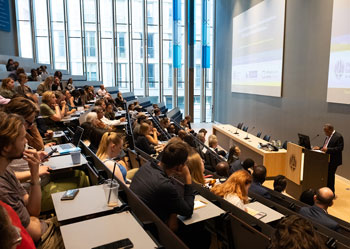News & Events
 Find the latest news below, and our event calendar on the right.
Find the latest news below, and our event calendar on the right.
Would you like to stay updated on our latest research news, publications and events? Please subscribe to our monthly newsletter!
Posted on 9 November 2011, last modified on 9 October 2023
26 January 2017
This new article by Akinyinka Akinyoade, Chikbuike Uche and guest researcher Ogbuagu Ekumankama investigates attempts by Nigerian Breweries (a subsidiary of Heineken) to increase its use of local raw materials for beer brewing. It argues that the greatest threat to this initiative has been inconsistent Nigerian Government policies, especially with respect to promoting the cultivation of local raw materials such as sorghum, replacing imported barley.
26 January 2017
In 1997 Mt. Kenya, a mountain region in Central Kenya, received World Heritage status. The designation rested entirely on natural scientific arguments. In her PhD thesis Marlous van den Akker disentangles a number of administrative, historical and political conditions that complicate Mt. Kenya but that have no place in the typical nature conservation discourse. During this seminar she will focus on such conditions. For example, a set of modifications were made to Mt. Kenya World Heritage Site in 2013, justified on the basis of biological and ecological arguments, yet truly initiated by white landowners’ anxieties over land expropriation.
20 January 2017
ASCL senior researcher Klaas van Walraven was interviewed by VPRO Bureau Buitenland about the situation in the Gambia. President Yahya Jammeh refuses to step down, while the newly elected president, Adama Barrow, has already been installed, in Senegal. Listen to the fragment (in Dutch).
19 January 2017
This seminar is co-organized with African Architecture Matters. Coen Beeker is a Dutch urban planner working in Africa between 1978 and 2010. He focused primarily on urban redevelopment in Ethiopia, Tunis, Sudan and Burkina Faso, most notably in Ouagadougou. The ‘Beeker Method’ is about redevelopment carried out by residents themselves. How can contemporary and future urban planners benefit from his work? Coen Beeker and colleagues will give presentations and a book will be launched.
17 January 2017
To celebrate the 20th anniversary of the Netherlands Association for Africa Studies, NVAS, NUFFIC and HHS are organizing a conference about “Education for life in Africa”. The aim of the conference is to provide a forum for education stakeholders in Africa to exchange ideas about how to attain and sustain quality at all levels of education in Africa. Check out the web dossier made by the ASCL Library, and the thematic map on education in Africa, published by the ASCL and ICLON.
16 January 2017
12 January 2017
26 December 2016
Because of the forthcoming retirement of our current director, the ASCL is looking for a new director who is a professor with international acclaim as a scholar in African Studies. The new director should be able to propagate a clear vision on African Studies and its future. The ASCL is an interfaculty institute of Leiden University. Read the full text of the vacancy. Application deadline: 1 February 2017.

